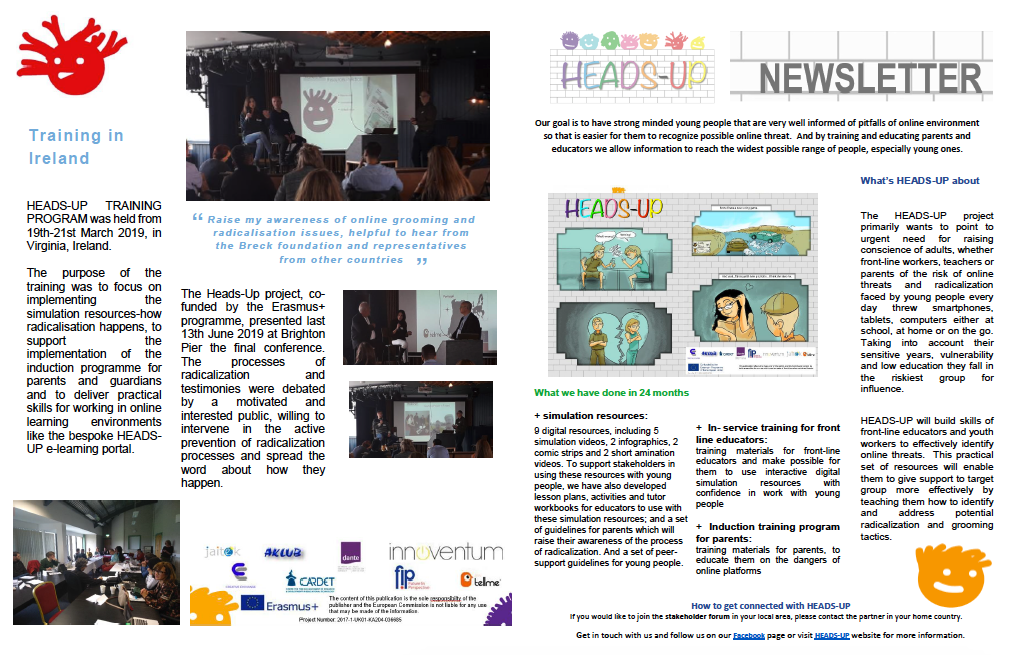Heads Up

Raising awareness of how radicalization happens for greater individual safety and country security
Program: Erasmus+
Action: Strategic Partnerships
Project reference: 2017-1-UK01-KA204-036685
Start date: 1/09/2017
Duration: 24 months
PARTNERS
1Creative Exchange UK Ltd, United Kingdom.
(CEX)
2Future In Perpective LIMITED, Ireland.
(FIPL)
3Centre For Advancement Of Research And Development In Educational Technology Ltd, Cyprus.
(CARDET)
4Storytellme, Unipersonal Lda, Portugal.
(STORYTELLME)
5Jaitek Tecnología y Formación S.L., Spain.
(JAITEK)
6Aklub Centrum Vzdelavani A Poradenstvi. Czech Republic.
(AKLUB)
7Ustanova Za Obrazovanje Odraslih, Croatia.
(DANTE)
8INNOVENTUM OY, Finland.
(INNOVENTUM)
Web Site: https://www.heads-up.online/
There is a perception that those at risk of radicalisation are vulnerable, poorly educated and disadvantaged young people but research has found that the demographics in relation to religion, age, sex, education and financial backgrounds vary. What has been found is that many become radicalized in response to emotive messages and visuals and through frustration or outrage at perceived injustice or inequality. Potential candidates for recruitment and radicalisation often make themselves known by ‘liking’ a particular post, donating to a cause, downloading information or even searching a particular topic. Terrorist organisations are experts in 'data mining'; engaging with these sympathisers by developing a relationship; often ‘love bombing’ the individual with positive and encouraging messages and fostering a sense of belonging and community. Like marketing companies, these organisations will research profiles, identifying age, background and interests then use the information to befriend and manipulate the targeted person. “For the post-Iraq (post-2003) generation especially, Internet chat rooms are now supplementing and replacing mosques, community centres and coffee shops as venues for recruitment.”
YouTube is being used effectively by extremist groups who use engaging visuals and hip-hop soundtracks in order to target young people. YouTube statistics show that 300 videos are uploaded per minute which makes it difficult to monitor. Certain uploads are tagged “promotes terrorism” to notify viewers of inappropriate content but they still get aired. Facebook has 1.3 billion active accounts and half of its users log on every day. It is used by extremists as a gateway to websites, to share information and propaganda and to identify and message potential recruits. Twitter provides a vehicle to disseminate information in real time, providing ‘breaking news’ which can be real of fake, often to gain sympathy or incite violence or hostility. Cyber magazines such as Inspire (Al-Qaeda in the Arabian Penninsula) and Dabig (Islamic State magazine) share skillfully edited information and images printed in English and other languages to reach a wide audience. The brothers responsible for the Boston Marathon bombings made homemade bombs using instructions from Inspire.
The media-savvy generation is becoming increasingly addicted to competitive on-line gaming where much of the action takes place in hostile environments. The pro-aggression attitude within the on-line gaming world promotes bullying and harassment as well as contributing to homophobia, racism and misogyny. Gaming has been identified for many years as a way for organisations to interact with young people. The US Army released the video game ”America’s Army” in 2002 in an effort to recruit young people while in 2006 a jihadist website featured a video game titled “Quest for Bush,” in which players battled Americans. In 2012 ISIL adapted the popular video game Grand Theft Auto to enable players to role-play as members of ISIL engaged in combat. The gaming world has the potential not only recruit but train soldiers. It’s easier to persuade a potential recruit to engage in on-line extremist activities such as cyber attacks and hacking if they do not have to leave home or risk death and it’s more cost effective for the terrorist organisation.
These are all issues that front line educators and youth workers are expected to address with their target groups. Young adults need support in any type of education but the vast and ever developing on-line world poses many challenges and potential dangers. HEADS-UP wants to build the skills of front liners through in-service training and a series of simulated videos that explicitly demonstrate those on-line threats. This practical, user friendly set of resources will enable educators to support their target groups more effectively by teaching them how to identify and deal with potential radicalization and grooming threats.
| The European Commission support for the production of this publication does not constitute an endorsement of the contents which reflects the views only of the authors, and the Commission cannot be held responsible for any use which may be made of the information contained therein. |  |






